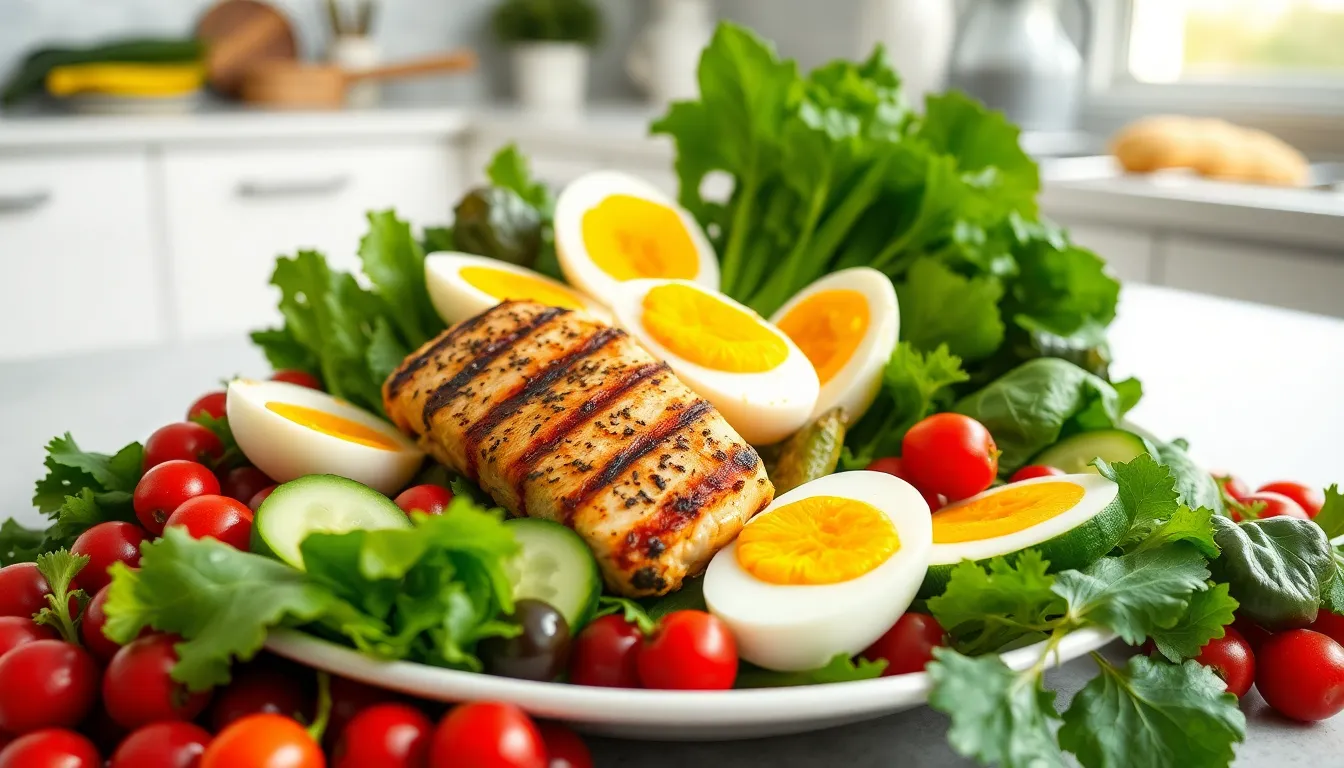Table of Contents
ToggleIn a world overflowing with diet fads and weight loss gimmicks, finding the right foods can feel like searching for a needle in a haystack. But what if the key to shedding those extra pounds lies not in deprivation but in deliciousness? That’s right! The right weight loss foods can turn your plate into a culinary adventure while helping you reach your goals.
Imagine munching on snacks that not only satisfy your cravings but also work hard to trim your waistline. From crunchy veggies to creamy delights, these foods pack a punch in flavor and nutrition. So let’s dive into the delightful world of weight loss foods and discover how to make your journey enjoyable, one bite at a time. Who said losing weight had to be boring?
Overview of Weight Loss Foods
Navigating weight loss involves selecting the right foods that promote health without sacrificing flavor. Many foods play a pivotal role in weight management, including lean proteins, vegetables, fruits, whole grains, and healthy fats.
Lean proteins such as chicken breast and fish aid in muscle maintenance and boost metabolism. Vegetables, particularly leafy greens like spinach and kale, offer low-calorie but nutrient-dense options that promote fullness. Fruits provide natural sweetness and essential vitamins, with berries being especially effective due to their high fiber content.
Whole grains, including quinoa and brown rice, supply energy while ensuring long-lasting satiety. Healthy fats found in avocados, nuts, and olive oil contribute to satisfaction and nutrient absorption. Incorporating these components creates a well-rounded and enjoyable eating plan.
Satisfying snacks can enhance weight loss success. Crunchy vegetables like carrots and cucumbers deliver fiber, keeping hunger at bay. Creamy options like yogurt or hummus provide protein and healthy fats, making them excellent choices for between meals.
Exploring these food options can make a significant difference in achieving weight loss goals. Individuals may find their cravings satisfied without resorting to deprivation. Eating weight loss foods encourages healthier habits and promotes a balanced lifestyle that supports enduring results.
Nutritional Benefits of Weight Loss Foods

Weight loss foods provide essential nutrients while supporting weight management. These options promote health without sacrificing flavor and enjoyment.
High-Protein Foods
High-protein foods play a significant role in weight loss. Lean meats, dairy, eggs, and legumes offer protein that supports muscle maintenance and metabolic boost. Each serving supplies amino acids necessary for body function while promoting satiety. Adding these foods to meals helps control hunger, leading to reduced overall calorie intake.
Low-Calorie Vegetables and Fruits
Low-calorie vegetables and fruits serve as powerful allies in weight loss efforts. Options such as leafy greens, cucumbers, and berries deliver essential vitamins while minimizing calorie consumption. Fiber-rich choices, like broccoli and apples, enhance fullness, making it easier to resist high-calorie snacks. Including a variety of these produce options in daily diets boosts nutrition and encourages healthier eating habits.
Best Weight Loss Foods to Incorporate
Incorporating specific foods into daily meals can significantly boost weight loss efforts. Enjoyable yet nutritious options exist for those seeking to enhance their diets.
Whole Grains
Whole grains serve as an excellent source of energy. They are rich in fiber, which aids digestion and promotes fullness. Examples of whole grains include brown rice, quinoa, and oats. Consuming these grains can stabilize blood sugar levels, helping to prevent cravings throughout the day. Switching refined grains for whole grains might also yield better weight loss results.
Lean Proteins
Lean proteins are vital for weight management. Chicken, turkey, and fish provide essential amino acids while remaining low in calories. Incorporating legumes, beans, and low-fat dairy offers additional protein sources. These options help maintain muscle mass, especially during weight loss. Fueling the body with adequate protein supports metabolism, allowing for more effective calorie burning.
Healthy Fats
Healthy fats play a crucial role in a weight loss plan. Sources like avocados, nuts, and olive oil enhance flavor and satisfaction. Including these fats in meals can promote hormone balance, which is essential for appetite regulation. They help absorb fat-soluble vitamins that contribute to well-being. Balancing portions of healthy fats prevents overindulgence while still satisfying cravings.
Foods to Avoid for Effective Weight Loss
Avoiding certain foods can significantly enhance weight loss efforts. Foods high in added sugars often lead to increased calorie consumption without providing nutritional benefits. Snacks like candy, pastries, and sugary beverages can contribute to weight gain.
High-calorie fast foods frequently lack essential nutrients and contain unhealthy fats. Meals from fast-food chains often lead to overeating due to their large portion sizes. Fried foods also pose a challenge; their high-calorie content can inhibit weight loss goals.
Processed snacks, including chips and cookies, usually contain high levels of sodium and unhealthy fats. These snacks provide little satiety and often lead to cravings. Additionally, foods labeled as “low-fat” or “fat-free” can be misleading. Many of these items contain added sugars to improve taste, increasing overall calorie content.
Refined carbohydrates, such as white bread and pastries, lack fiber and can spike blood sugar levels. These spikes often result in rapid hunger, making it challenging to stick to a nutritious meal plan. Furthermore, alcohol can hinder weight loss progress due to its calorie density and tendency to reduce self-control.
Moreover, eating late at night can disrupt metabolism and affect sleep quality, further complicating weight loss efforts. Sticking to whole, nutritious foods can often yield better results. Maintaining focus on high-fiber fruits, vegetables, and lean proteins simplifies the weight management journey.
Weight Loss Foods and Meal Planning
Incorporating specific weight loss foods into daily meal planning enhances the effectiveness of efforts. Lean proteins such as chicken, turkey, and fish contribute significantly to muscle maintenance and metabolism support. Whole grains, including brown rice, quinoa, and oats, feature high fiber content that aids digestion and promotes fullness, ensuring stable blood sugar levels.
Vegetables play a critical role as nutrient-dense options that boost health. Leafy greens and cruciferous vegetables provide essential vitamins and minerals while helping to keep calories low. Fruits like berries, apples, and oranges are not only delicious but also filled with vitamins and fiber, which assists in enhancing satiety and resisting high-calorie snacks.
Planning meals that include healthy fats makes a difference. Sources like avocados, nuts, and olive oil enhance flavor while promoting hormone balance and nutrient absorption. Including these foods ensures satisfying meals that keep hunger at bay.
For effective weight loss, meals should focus on variety and balance. A plate filled with half vegetables, a quarter lean protein, and a quarter whole grains creates a nutritious and filling meal. Snacks can consist of crunchy vegetables or creamy options like yogurt and hummus, providing tasty alternatives to high-calorie items.
Avoiding high-calorie options is essential for success. Foods packed with added sugars, refined carbohydrates, and unhealthy fats only hinder progress. Menu choices should prioritize whole, nutrient-rich foods that simplify the weight management journey and yield lasting results, proving that enjoyable meals and weight loss can coexist.
Embracing nutritious and satisfying foods can transform the weight loss journey into a pleasurable experience. By incorporating lean proteins vegetables fruits whole grains and healthy fats into daily meals individuals can achieve their weight loss goals without feeling deprived.
Meal planning that focuses on these essential foods not only supports weight management but also promotes overall health and well-being. Avoiding high-calorie processed options while prioritizing whole nutrient-rich foods can lead to lasting results.
Ultimately it’s about finding balance and enjoying delicious meals that nourish the body. With the right approach to food choices weight loss can be both effective and enjoyable.




